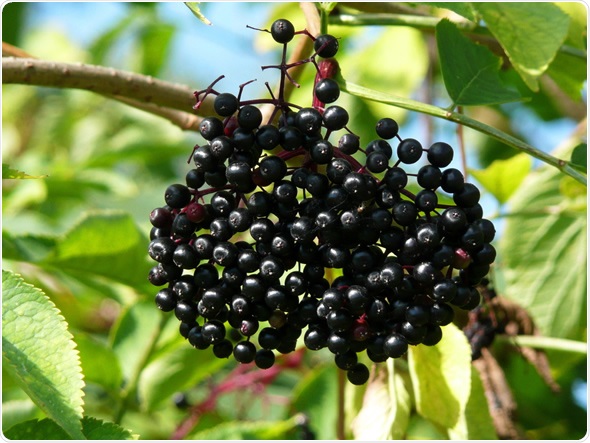What is Elderberry?

The elder tree is considered to be either an overgrown shrub or a small tree. It grows well in sunny conditions. Though a native of Europe, Africa and some regions in Asia, it is now found all over the USA following its introduction to the continent.
The elder plant Sambucus nigra is valuable for its berries, blue or purple, as well as its wood. Its active alkaloids consist of hydrocyanic acid and sambucine, and both cause nausea. These are found in the unripe berries, the leaves, the bark and the seeds. These should therefore never be included in a medicinal preparation.

Black elderberry extract has been known to activate the healthy immune system, and so increase inflammatory cytokine release, most strikingly TNF-alpha. They are active against viral antigens, especially influenza. They are also suggested to have anti-cancer actions, and have one of the highest percentages of antioxidant flavonoids, which help to prevent oxidative damage to the body cells, including the DNA. The ripe berries have high Vitamin A and C content. Moreover, they contain large amounts of calcium, iron, phosphorus, vitamin B6 and sterols, as well as essential oils.
The wide array of polyphenols in elderberry includes flavonoids such as flavonols and flavones, anthocyanins such as cyanidin, and phenolic compounds.
The berries are used in complementary medicine and also as fresh or dried food during both summer and winter. They produce diaphoresis, helping to break a fever. They also have laxative and diuretic properties. They are used to treat inflammations, including arthritis, and congestion of the upper respiratory system. However, uncooked berries may cause nausea, and cooking is safer.
In medieval times the elder tree had the reputation of being a holy tree because of its medicinal value. However, Sambucus ebulus, the dwarf elder, may be toxic and its ingestion should be avoided.
Its flat white flowers are five pointed, and are edible. They contain rutin and flavonoid alkaloids. They also contain tannins, and thus the extract is useful in treating bleeding, diarrhea and nasal congestion. They are the mildest part of the plant. They are dipped into flour and eaten as fritters. Elder flower tea is used for reducing fevers, as well as to relieve various inflammations. Leaf or flower washes help cleanse and soothe skin wounds, as well as heal hematomas or ligament injuries. Leaves, flowers, bark or even the young branches are made into a paste for use as a poultice mixed with chamomile, for use over all kinds of inflamed or sore areas, including bee stings. The berries may be juiced for use in treating burns, while oral use leads to strong laxative action.
Elderberry is used in complementary medicine as a topical wound preparation, for oral use in colds and the flu, and in various proprietary preparations. Available research shows that these shorten the duration of flu and reduce the symptoms of congestion in colds. However, how much of this effect is due to the elderberry extract itself is unknown, as these preparations contain other herbs and even vitamins in addition.
Precautions
- Avoid the use of elderberry in pregnancy and lactation
- Avoid its use in autoimmune diseases, as it may cause flareups
- Avoid unripe and uncooked elderberries
- Consult your doctor before you start any herbal preparations to avoid potentially harmful interactions
Examples of such interactions include:
- It could intensify the effect of diuretics
- It may lower the blood sugar if you are on diabetic medication
- It may increase the laxative action of other laxatives
- It may reduce the bronchodilatory effects of theophylline, a medication taken in asthma
- It may reduce the immunosuppressive effects of drugs taken to treat autoimmune diseases like lupus
References
- https://umm.edu/health/medical/altmed/herb/elderberry
- http://plants.usda.gov/plantguide/pdf/cs_sanic4.pdf
- http://www.cdc.gov/mmwr/preview/mmwrhtml/00000311.htm
- https://www.hort.purdue.edu/newcrop/ncnu07/pdfs/charlebois284-292.pdf
Further Reading
- All Elderberry Content
Last Updated: Aug 23, 2018

Written by
Dr. Liji Thomas
Dr. Liji Thomas is an OB-GYN, who graduated from the Government Medical College, University of Calicut, Kerala, in 2001. Liji practiced as a full-time consultant in obstetrics/gynecology in a private hospital for a few years following her graduation. She has counseled hundreds of patients facing issues from pregnancy-related problems and infertility, and has been in charge of over 2,000 deliveries, striving always to achieve a normal delivery rather than operative.
Source: Read Full Article